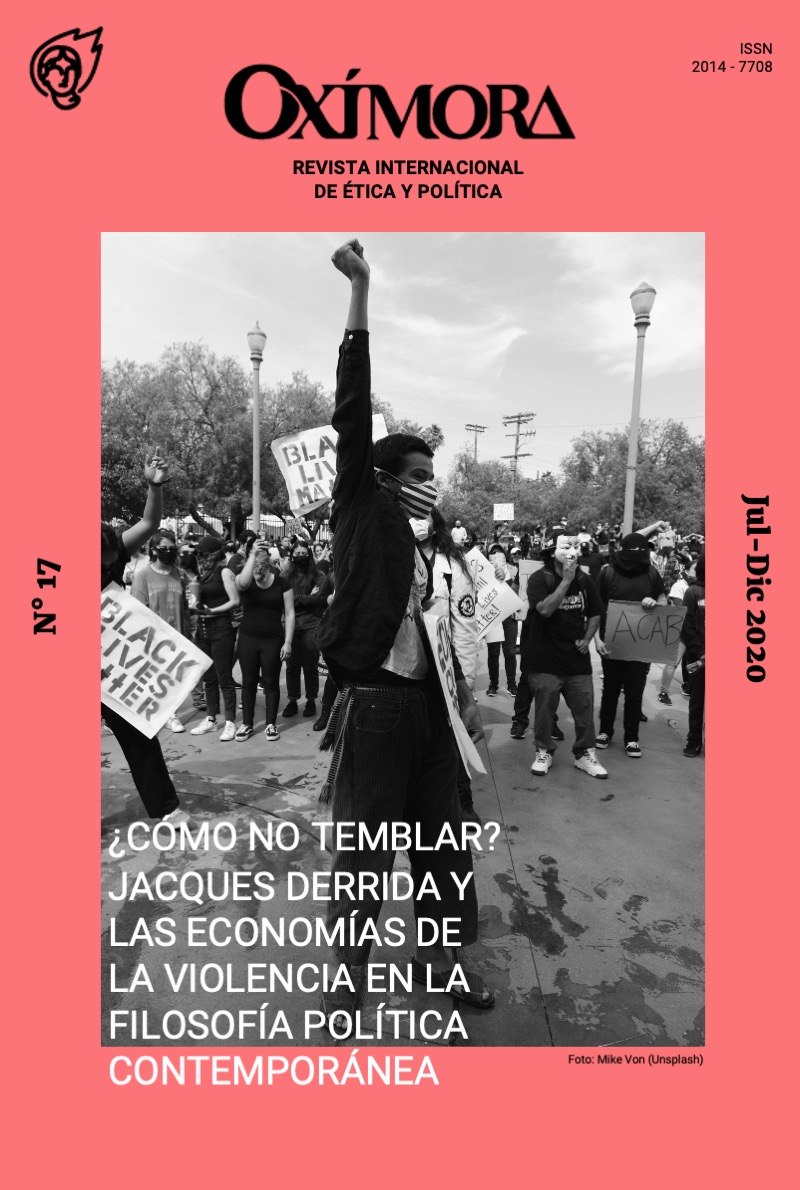Textos sobre violencia: de lo impuro. (Contaminaciones, equívocos, temblores)
DOI:
https://doi.org/10.1344/oxi.2020.i17.31566Palabras clave:
Deconstrucción, ley, Jacques Derrida, Giorgio Agamben, Walter Benjamin, crítica de la violencia, justiciaResumen
Este artículo interroga cierta escena filosófica –una que se constituye a través de la posición de lo que Jacques Derrida llama “la instancia ética de la violencia”. En el curso del ensayo, analizo esta escena cuasi-jurídica a través de las lecturas de Aristóteles, Walter Benjamin y Giorgio Agamben, entre otros. La escena, construida sobre textos sobre textos sobre violencia, exige una lógica de la pureza; es recelosa de conta-minaciones y equívocos. Y sin embargo, se alimenta de ellos. Analizando las implicaciones del texto, la escritura y la huella para el discurso filosófico sobre la violencia, sigo a Derrida “solo para ver” que puede hacer temblar esta escena.
Citas
AGAMBEN, Giorgio. (1998). Homo Sacer. Sovereign Power and Bare Life. Stanford: Stanford University Press.
AGAMBEN, Giorgio. (1999). Potentialities: Collected Essays in Philosophy. Stanford: Stanford University Press.
AGAMBEN, Giorgio. (2005a). State of Exception. Chicago: The University of Chicago Press.
AGAMBEN, Giorgio. (2005b). The Time That Remains: A Commentary on the Letter to the Romans. Stanford: Stanford University Press.
AGAMBEN, Giorgio. (2015). The Use of Bodies. Stanford: Stanford University Press.
AGAMBEN, Giorgio. (2019). Creation and Anarchy: The Work of Art and the Religion of Capitalism. Stanford: Stanford University Press.
ARISTOTLE. (2011). Nicomachean Ethics. Chicago: The University of Chicago Press.
BENJAMIN, Walter. (1996). Selected Writings. Volume 1. Cambridge: Harvard University Press.
BENNINGTON, Geoffrey. (2016). Scatter 1: The Politics of Politics in Foucault, Heidegger, and Derrida. New York: Fordham University Press.
BERNSTEIN, Richard. (2013). Violence: Thinking Without Bannisters. Cambridge: Polity Press.
BOSTEELS, Bruno. (2017). “Critique of Originary Violence: Freud, Heidegger, Derrida.” The Undecidable Unconscious, 4, 27-66.
BUTLER, Judith. (2020). The Force of Nonviolence: An Ethico-Political Bind. London and New york: Verso.
CAMPOS-SALVATERRA, Valeria. (2019). “The Original Polemos: Phenomenology and Violence in Jacques Derrida.” In G. Rae and E. Ingala (eds). The Meanings of Violence: From Critical Theory to Biopolitics. New York: Routledge.
DERRIDA, Jacques. (1978). Writing and Difference. London and New York: Routledge.
DERRIDA, Jacques. (1981). Dissemination. London: The Athlone Press.
DERRIDA, Jacques. (1988). Limited Inc. Evanston: Northwestern University Press.
DERRIDA, Jacques. (1992a). Acts of Literature. New York and London: Routledge.
DERRIDA, Jacques. (1992b). Given Time: I. Counterfeit Money. Chicago: The University of Chicago Press.
DERRIDA, Jacques. (1993). Aporias. Stanford: Stanford University Press.
DERRIDA, Jacques. (1995). The Gift of Death. Chicago: The University of Chicago Press.
DERRIDA, Jacques. (1996). “Remarks on Deconstruction and Pragmatism.” In C. Mouffe (ed). Deconstruction and Pragmatism. London and New York: Routledge.
DERRIDA, Jacques. (1997). Of Grammatology. Corrected Edition. Baltimore: The Johns Hopkins University Press.
DERRIDA, Jacques. (2001). A Taste for the Secret. Cambridge: Polity Press.
DERRIDA, Jacques. (2002). Acts of Religion. New York and London: Routledge.
DERRIDA, Jacques. (2005). The Politics of Friendship. London and New York: Verso.
DERRIDA, Jacques. (2006). “Comment ne pas trembler?” Annali: Fondazione europea del disegno (Fondation Adami), 2, 91-104.
GASCHÉ, R. (2016). Deconstruction, Its Force, Its Violence. Albany: SUNY Press.
HÄGGLUND, Martin. (2008). Radical Atheism: Derrida and the Time of Life. Stanford: Stanford University Press.
HÄGGLUND, Martin. (2011). “The Radical Evil of Deconstruction: A Reply to John Caputo.” Journal for Cultural and Religious Theory, 11 (2), 126-150.
HAMACHER, Werner. (1994). “Afformative, Strike: Benjamin’s ‘Critique of Violence.’” In A. Benjamin and P. Osborne (eds). Walter Benjamin’s Philosophy: Destruction and Experience. London and New York: Routledge.
HAMACHER, Werner. (2002). “Guilt History: Benjamin’s Sketch ‘Capitalism as Religion.’” Diacritics, 32 (3-4), 81-106.
HANSSEN, Beatrice. (2000). Critique of Violence. Between Poststructuralism and Critical Theory. London and New York: Routledge.
JOHNSON, David. (2007). “As If the Time Were Now: Deconstructing Agamben.” The South Atlantic Quaterly, 106 (2), 265-290.
MARTEL, James. (2015). “The Anarchist Life we are Already Living: Benjamin and Agamben on Bare Life and the Resistance to Sovereignty.” In B. Moran and C. Salzani (eds). Towards the Critique of Violence: Walter Benjamin and Giorgio Agamben. London and New York: Bloomsbury Academic.
MORAN, Brendan and SALZANI, Carlo. (2015). “Introduction: On the Actuality of ‘Critique of Violence.’” In B. Moran and C. Salzani (eds). Towards the Critique of Violence: Walter Benjamin and Giorgio Agamben. London and New York: Bloomsbury Academic.
MERCIER, Thomas Clément. (2016). “Resisting Legitimacy: Weber, Derrida, and the Fallibility of Sovereign Power.” Global Discourse, 6 (3), 374-391.
MERCIER, Thomas Clément. (2018). “We Have Tasted the Powers of the Age to Come: Thinking of Force of the Event – from Dynamis to Puissance.” Oxford Literary Review, 40 (1), 76-94.
NAAS, Michael. (2009). “An Atheism that (Dieu merci!) Still Leaves Something to be Desired.” CR: The New Centennial Review, 9 (1), 45-68.
SCHEURMANN, I. and K. (eds). (1992). Für Walter Benjamin. Dokumente, Essays und ein Entwurf. Frankfurt am Main: Suhrkamp.
VITALE, Francesco. (2018). Biodeconstruction: Jacques Derrida and the Life Sciences. New York: SUNY Press.
ŽIŽEK, S. (2016). Against the Double Blackmail: Refugees, Terror and Other Troubles with the Neighbours. London: Allen Lane.
Descargas
Publicado
Cómo citar
Número
Sección
Licencia
a) El/la autor/a conserva los derechos de autoría, otorgando a la revista el derecho de primera publicación de la obra.
b) Los textos se difundirán con la licencia de reconocimiento de Creative Commons (CC BY) que permite compartir la obra con terceros, siempre que estos reconozcan su autoría, su publicación inicial en esta revista y las condiciones de la licencia.



